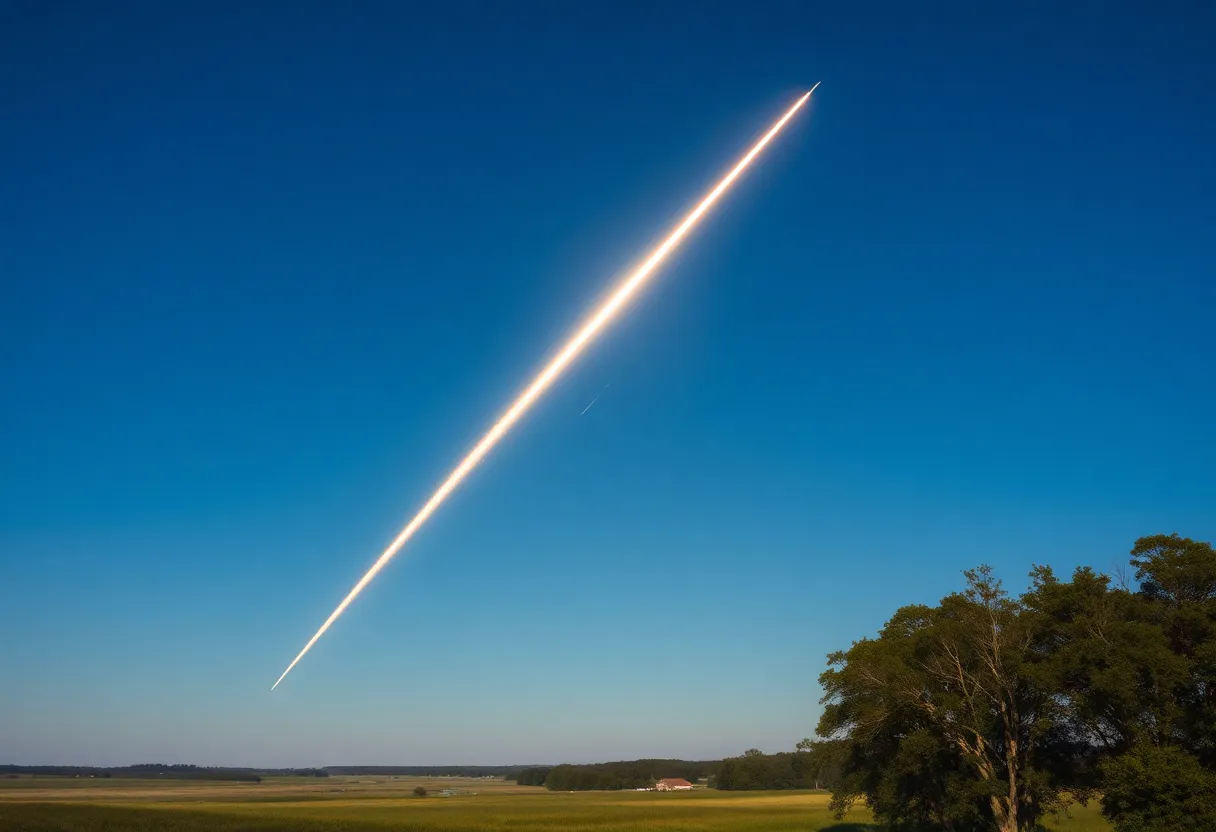News Summary
A rare daytime fireball event was witnessed this month across several states in the Southeastern U.S., including Georgia, South Carolina, and Tennessee. Observers reported loud booms and intense shaking as the fireball, moving at 30,000 mph, exploded mid-air, releasing energy equivalent to 20 tons of TNT. Potential meteorite recovery has sparked interest, as eyewitness accounts and satellite images confirm its significant presence. This event provides scientists and enthusiasts with a unique opportunity for analysis and recovery of meteorites.
Oxford, Georgia – A rare daytime fireball event lit up the skies across the Southeastern United States on June 26, 2025. Spotted by over 160 witnesses, the bright fireball was observed moving southwest at an impressive speed of 30,000 miles per hour around 12:25 p.m. EDT. This extraordinary occurrence has captured the attention of both residents and scientists, as it resulted in sonic booms and potential meteorite recovery opportunities.
The fireball was initially seen at an altitude of 48 miles above Oxford, Georgia, before it exploded roughly 27 miles above West Forest, Georgia. The energy released during the explosion was equivalent to that of 20 tons of TNT, indicating the fireball’s significant size. Measuring approximately three feet in diameter and weighing over a ton (2,000 pounds), this meteor was noteworthy not only for its visual impact but also for its physical characteristics.
In the aftermath of the fireball event, reports began pouring in from various states including Georgia, South Carolina, Tennessee, and Alabama. Observers in the metro Atlanta area noted intense shaking and loud booms, likely the result of the pressure wave generated by the fireball’s explosion. In a particularly striking account, a resident from Henry County, Georgia, reported that a “rock” had fallen through their roof shortly after the fireball was seen. Such incidents sparked interest and concern about potential meteorite landings.
NOAA satellites, including the Geostationary Lightning Mapper, were able to capture the moment the fireball crossed the atmosphere, further confirming the widespread nature of the sighting. While fireball events, which often go unnoticed due to their occurrence over oceans or remote areas, are typically rare, this daytime sighting was particularly unusual given its visibility and the concurrent Beta Taurid meteor shower peak around June 25.
In South Carolina, fire officials in Anderson County began to search for possible meteorites following the multitude of reported fireballs. Additionally, social media users shared videos and dashcam footage, documenting the stunning sight as the meteor streaked across the sky. This collective evidence added to the excitement and legitimacy of the event.
According to the National Weather Service, many reports of the fireball were confirmed, underlining the significance of the phenomenon. Observers noted that the occurrence could provide a unique opportunity for meteorite recovery if any confirmed landings occur following the fireball’s descent.
Historically, significant meteorite recoveries have been infrequent in this region. The last meteorite found in Georgia dates back to 2009, while South Carolina has not recovered a meteorite since 1933. This adds an element of curiosity and anticipation to the current event as experts and enthusiasts await further developments.
In conclusion, the midday fireball event of June 26 was not only a captivating spectacle for those who witnessed it but also presents a variety of scientific opportunities for analyzing the meteor. With the potential for meteorite recovery heightened by this occurrence, researchers are keen to explore the aftermath and gather further insights into the event.
Deeper Dive: News & Info About This Topic
HERE Resources
Spectacular Fireball Lights Up Southeastern Skies
Massive Meteor Causes Sonic Boom and Damage in North Georgia
Additional Resources
- CBS News
- Wikipedia: Meteorite
- Fox Carolina
- Google Search: Fireball June 26 2025
- New York Times
- Google Scholar: Meteor Events
- Newsweek
- Encyclopedia Britannica: Meteor Event
- NBC News
- Google News: Fireball June 2025

Author: HERE Greenwood
The GREENWOOD STAFF WRITER represents the experienced team at HEREGreenwood.com, your go-to source for actionable local news and information in Greenwood, Greenwood County, and beyond. Specializing in "news you can use," we cover essential topics like product reviews for personal and business needs, local business directories, politics, real estate trends, neighborhood insights, and state news affecting the area—with deep expertise drawn from years of dedicated reporting and strong community input, including local press releases and business updates. We deliver top reporting on high-value events such as the Festival of Flowers, Greenwood Community Theatre performances, and agricultural showcases at the Greenwood County Fairgrounds. Our coverage extends to key organizations like the Greenwood Chamber of Commerce and the Greater Greenwood United Ministry, plus leading businesses in manufacturing and healthcare that power the local economy such as FujiFilm Manufacturing and Self Regional Healthcare. As part of the broader HERE network, including HERECharleston.com, HEREColumbia.com, HEREGreenville.com, and HEREHiltonHead.com, we provide comprehensive, credible insights into South Carolina's dynamic landscape.





